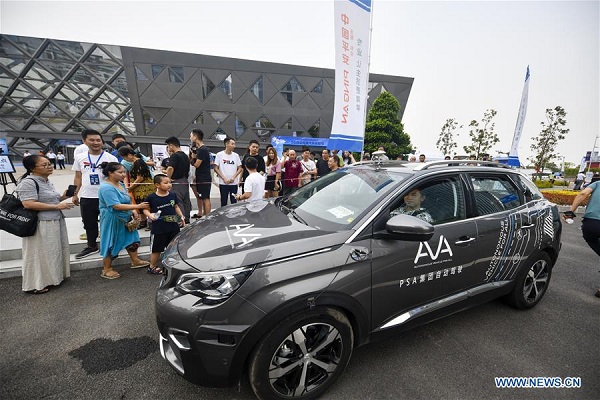Jump-starting China's self-driving vehicle industry
Updated:2019-09-02
Xinhua
 |
|
Citizens prepare to get on a competition car of i-Vista Self-driving Cars Challenge during an experience day event in Southwest China's Chongqing municipality, Aug 28, 2019. A two-day experience event for 5G self-driving cars kicked off in Chongqing Wednesday during the 2019 Smart China Expo. [Photo by Liu Chan/Xinhua] |
With a screech of brakes and cheers from the audience, a heavy truck stopped just in front of a dummy.
From conventional car-markers and technology unicorns to universities and research institutions, leaders in China's booming self-driving car industry gathered at the six-day i-Vista Self-driving Cars Challenge at the 2019 Smart China Expo, in the southwestern Chongqing municipality.
Sedans, trucks, shuttle buses and road-sweepers showed China is embracing self-driving vehicles.
Although China is a latecomer to the market, ambitious plans from technology giants like Baidu, Alibaba and Tencent as well as startups like Pony.ai have jump-started the industry.
According to the Autonomous Vehicle Disengagement Reports 2018 issued by California Department of Motor Vehicles, Baidu and Pony.ai were in the top ten for most miles driven and least number of "disengagement events."
A disengagement refers to an instance when a human overrides the self-driving system by manually operating the vehicle.
Chongqing, one of China's most mountainous cities, has a unique road system that is great for evaluating the performance of Chinese self-driving cars, according to experts.
The challenges included contests like autonomous emergency braking and parking, and complicated city traffic scenarios. In city traffic challenge, for instance, 31 self-driving cars were tested on overtaking, hump bridges and yielding to pedestrians, among other things.
Zhang Xinyu, leader of the self-driving team at Tsinghua University, said perception of the surrounding environment is still a key challenge for self-driving systems. For instance, there are certain limits to visual and radar perception, and satellite navigation systems still can't cope with too many obstacles ahead.
The safety of self-driving in real-world traffic still has a long way to go. The ethical challenges of self-driving need to be figured out. In extreme conditions, whose life comes first: a pedestrian or a passenger? Who makes the split-second call? Who shoulders the legal responsibility?
At a summit during the expo, Robin Li, Baidu co-founder and chief executive officer, said people once talked about how far a self-driving car could go without human intervention. Today, the industry focuses on safety and affordability.
Analysts said although the industry in China has yet to catch up with international counterparts in terms of deep-learning systems powering the vehicles, companies can take advantage of massive data and support from the government and public.
Li said China has advantages in infrastructure and self-driving developers can install equipment along roads to enhance safety and efficiency in test rides.
Zhou Zhou, a deputy general manager of China Automotive Engineering Research Institute, pointed out that 5G networks will bring so-called "edge computing" to self-driving cars, enabling data travel at high speeds without having to travel long to a data center. It is expected to significantly reduce the cost of self-driving cars.
Video

John Edwards, the UK trade commissioner for China, praised Chongqing over its rise as a burgeoning center in intelligent manufacturing.





